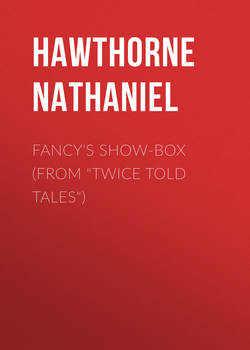Читать книгу Fancy's Show-Box (From "Twice Told Tales") - Hawthorne Nathaniel - Страница 1
FANCY'S SHOW-BOX
ОглавлениеA MORALITY
What is Guilt? A stain upon the soul. And it is a point of vast interest, whether the soul may contract such stains, in all their depth and flagrancy, from deeds which may have been plotted and resolved upon, but which, physically, have never had existence. Must the fleshly hand and visible frame of man set its seal to the evil designs of the soul, in order to give them their entire validity against the sinner? Or, while none but crimes perpetrated are cognizable before an earthly tribunal, will guilty thoughts, – of which guilty deeds are no more than shadows, – will these draw down the full weight of a condemning sentence, in the supreme court of eternity? In the solitude of a midnight chamber, or in a desert, afar from men, or in a church, while the body is kneeling, the soul may pollute itself even with those crimes, which we are accustomed to deem altogether carnal. If this be true, it is a fearful truth.
Let us illustrate the subject by an imaginary example. A venerable gentleman, one Mr. Smith, who had long been regarded as a pattern of moral excellence, was warming his aged blood with a glass or two of generous wine. His children being gone forth about their worldly business, and his grandchildren at school, he sat alone, in a deep, luxurious arm-chair, with his feet beneath a richly carved mahogany table. Some old people have a dread of solitude, and when better company may not be had, rejoice even to hear the quiet breathing of a babe, asleep upon the carpet. But Mr. Smith, whose silver hair was the bright symbol of a life unstained, except by such spots as are inseparable from human nature, he had no need of a babe to protect him by its purity, nor of a grown person to stand between him and his own soul. Nevertheless, either Manhood must converse with Age, or Womanhood must soothe him with gentle cares, or Infancy must sport around his chair, or his thoughts will stray into the misty region of the past, and the old man be chill and sad. Wine will not always cheer him. Such might have been the case with Mr. Smith, when, through the brilliant medium of his glass of old Madeira, he beheld three figures entering the room. These were Fancy, who had assumed the garb and aspect of an itinerant showman, with a box of pictures on her back; and Memory, in the likeness of a clerk, with a pen behind her ear, an inkhorn at her buttonhole, and a huge manuscript volume beneath her arm; and lastly, behind the other two, a person shrouded in a dusky mantle, which concealed both face and form. But Mr. Smith had a shrewd idea that it was Conscience.
How kind of Fancy, Memory, and Conscience to visit the old gentleman, just as he was beginning to imagine that the wine had neither so bright a sparkle nor so excellent a flavor as when himself and the liquor were less aged! Through the dim length of the apartment, where crimson curtains muffled the glare of sunshine, and created a rich obscurity, the three guests drew near the silver-haired old mail. Memory, with a finger between the leaves of her huge volume, placed herself at his right hand. Conscience, with her face still hidden in the dusky mantle, took her station on the left, so as to be next his heart; while Fancy set down her picture-box upon the table, with the magnifying-glass convenient to his eye. We can sketch merely the outlines of two or three out of the many pictures which, at the pulling of a string, successively peopled the box with the semblances of living scenes.
